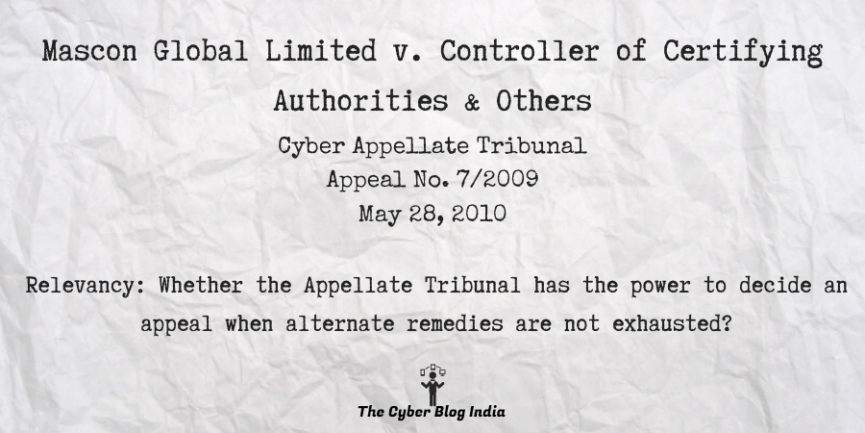Mascon Global Limited v. Controller of Certifying Authorities & Others

Mascon Global Limited v. Controller of Certifying Authorities & Others
In the Cyber Appellate Tribunal, New Delhi
Appeal No. 7/2009
Before Mr Rajesh Tandon, Chairperson
Decided on May 28, 2010
Relevancy of the case: Whether the Appellate Tribunal has the power to decide an appeal when alternate remedies are not exhausted?
Statutes & Provisions Involved
- The Information Technology Act, 2000 (Section 43, 46, 57, 58)
- The Code of Criminal Procedure, 1973 (Section 151)
- The Indian Penal Code, 1860 (Section 193, 228)
- The Constitution of India, 1950 (Section 226, 227)
- The Income Tax Act, 1961 (Section 43)
Relevant Facts of the Case
- The appellant company was run by its chairman and CEO Mr Sandy K Chandra, who’d been able to transform the company and with his hard work and effort improved the applicant company’s revenue several times.
- Some defamatory and offensive emails were sent from kashinath.aruna@gmail.com and avinash.agnihotry@gmail.com respectively in the names of Aruna Kashinath and Avinash Agnihotry. These were sent to the company’s email ID to tarnish the reputation of both, the company and the Chairman, as alleged by the appellants.
- Avinash and Aruna apparently were the employees of the company’s management team. It was also alleged that the company enquired both of them regarding this mail but both of them denied any nexus with the said mail.
- The appellant has prayed for a direction by the present appeal to respondent No. 1, Controller of the Certifying Authority to investigate the numerous infringements of the regulations of the Information Technology Act, 2000 as stated in the appellant’s complaint to the Controller of the Certifying Authority of 23.9.2009. It was also prayed to further instruct respondents 2 and 3 to assist the Certifying Authority in its investigation of the various infringements of the provisions.
Prominent Arguments by the Advocates
Counsel for the Appellant:
- This Court has absolute authority to determine the appeal even without the alternative remedy being exhausted. To support the claim, the appellant’s counsel has referred to the provisions of Section 58 of the Information Technology Act, 2000.
Counsels for the respondents:
- The present appeal is void because under Section 57 of the Information Technology Act, 2000, an appeal can only be filed under Cyber Appellate Tribunal against an order given by a controller or an adjudicating officer. Hence, no appeal is passed by the controller and this cannot be filed. It was also submitted that this appeal is filed by the appellant without even waiting for the controller to review it. Also, it was clear from the statement made by the appellant himself that he filed a complaint to the Controller on 23 September 2009 and filed this appeal on 24 September 2009. It was also submitted by the respondents that no appeal can be filed before the Tribunal without exhausting the alternate remedies.
Opinion of the Bench
- No appeal is maintainable under Section 57 of the Information Technology Act without exhausting the alternate remedy. As the appellant didn’t approach the adjudicating officer under IT Act, 2000 this appeal is not maintainable.
- The reports sent by the appellant to the Controller of Certifying Authority doesn’t comply with the requirements of Section 46 of the Information Technology Act, 2000. He must have gone to the adjudicating officer instead, who is competent to resolve this. An adjudicating officer is the one who is responsible to deal with cases of this nature.
Final Decision
- The appeal was dismissed as it lacked merit.
- The appellant was given 30 days of time to file a complaint with the Adjudicating Officer, even though he exhausted the time limit.
- All pending applications filed by the appellant were disposed of.
- The parties were ordered to bear their costs and the copies of this judgement were sent to the respective States’ and Union Territories’ adjudicating officers.
This case summary has been prepared by Akshara Kamath, an undergraduate student at Symbiosis Law School, Hyderabad, during her internship with The Cyber Blog India in June/July 2020.
